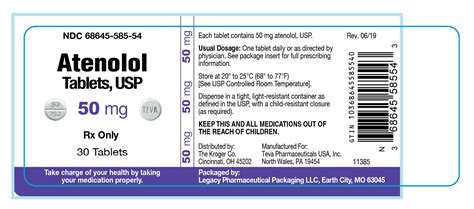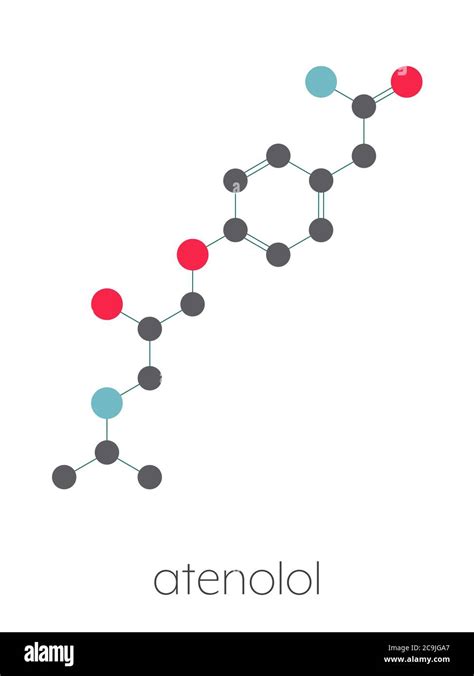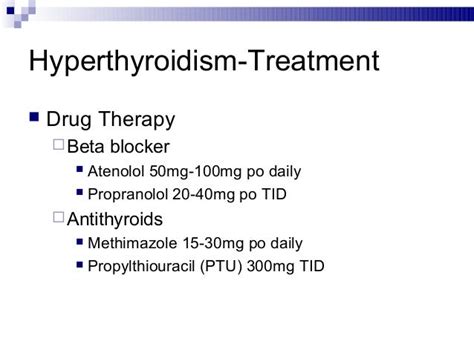Intro
Discover the versatile uses of Atenolol, a beta-blocker medication, in managing hypertension, angina, heart failure, and arrhythmias, while also exploring its applications in migraine prevention and performance anxiety treatment.
Atenolol is a medication that belongs to the class of beta-blockers, which are used to treat various cardiovascular conditions. It works by blocking the action of certain natural chemicals in the body, such as epinephrine, that affect the heart and blood vessels. This leads to a decrease in heart rate, blood pressure, and the heart's workload. Atenolol is commonly prescribed to patients with high blood pressure, chest pain, and certain heart-related conditions. In this article, we will explore the 5 uses of atenolol and its benefits in managing these conditions.
Atenolol has been widely used for decades to treat various cardiovascular diseases. Its effectiveness in reducing blood pressure, heart rate, and the risk of heart attacks has made it a popular choice among doctors. Moreover, atenolol is also used to prevent migraine headaches, treat anxiety and tremors, and manage symptoms of hyperthyroidism. With its wide range of applications, atenolol has become an essential medication in the field of cardiology.
The uses of atenolol are diverse and have been extensively studied. It is essential to understand the benefits and potential side effects of this medication to ensure safe and effective treatment. Patients taking atenolol should be aware of its interactions with other medications and follow their doctor's instructions carefully. By doing so, they can maximize the benefits of atenolol and minimize the risk of adverse reactions. In the following sections, we will delve into the 5 uses of atenolol and explore its working mechanisms, benefits, and potential side effects.
What is Atenolol Used For?

Benefits of Atenolol
The benefits of atenolol are numerous. It has been shown to reduce the risk of heart attacks, strokes, and kidney disease in patients with high blood pressure. Atenolol also improves survival after a heart attack and reduces the risk of recurrent heart attacks. Moreover, it has been shown to reduce the frequency and severity of migraine headaches and improve symptoms of anxiety and tremors.How Does Atenolol Work?

Steps to Take Atenolol
To take atenolol safely and effectively, patients should follow these steps: * Take atenolol exactly as prescribed by your doctor. * Do not stop taking atenolol without consulting your doctor. * Take atenolol at the same time every day. * Do not crush or chew atenolol tablets. * Swallow atenolol tablets whole with a glass of water.Side Effects of Atenolol

Precautions and Warnings
Patients taking atenolol should be aware of the following precautions and warnings: * Atenolol can worsen heart failure in some patients. * Atenolol can cause a slow heart rate and low blood pressure. * Atenolol can interact with other medications, such as certain antidepressants and antihistamines. * Atenolol can worsen respiratory conditions, such as asthma or COPD.Atenolol for High Blood Pressure

Atenolol for Chest Pain
Atenolol is also used to treat chest pain (angina). It works by reducing the heart's workload and decreasing the amount of oxygen it needs. This helps to reduce the frequency and severity of chest pain episodes. Atenolol is often used in combination with other medications, such as nitrates or calcium channel blockers, to treat chest pain.Atenolol for Migraine Headaches

Atenolol for Anxiety and Tremors
Atenolol is sometimes used to treat anxiety and tremors. It works by blocking the action of certain natural chemicals in the body, such as epinephrine, that can cause anxiety and tremors. Atenolol is often used in combination with other medications, such as benzodiazepines or antidepressants, to treat anxiety and tremors.Atenolol for Hyperthyroidism

In conclusion, atenolol is a versatile medication that has been used to treat various cardiovascular conditions, including high blood pressure, chest pain, and migraine headaches. Its ability to block the action of certain natural chemicals in the body makes it an effective treatment option for these conditions. However, patients should be aware of the potential side effects and precautions associated with atenolol. By following the instructions of their doctor and taking atenolol as prescribed, patients can maximize the benefits of this medication and minimize the risk of adverse reactions.
We invite you to share your thoughts and experiences with atenolol in the comments section below. If you have any questions or concerns about atenolol, please do not hesitate to ask. We also encourage you to share this article with others who may benefit from the information.
What is atenolol used for?
+Atenolol is used to treat high blood pressure, chest pain, and migraine headaches. It is also used to prevent recurrent heart attacks and to manage symptoms of hyperthyroidism.
How does atenolol work?
+Atenolol works by blocking the action of certain natural chemicals in the body, such as epinephrine, that affect the heart and blood vessels. This leads to a decrease in heart rate, blood pressure, and the heart's workload.
What are the side effects of atenolol?
+Common side effects of atenolol include fatigue, dizziness, lightheadedness, nausea, diarrhea, constipation, cold hands and feet, and sleep disturbances.
Can atenolol be used for anxiety and tremors?
+Yes, atenolol can be used to treat anxiety and tremors. It works by blocking the action of certain natural chemicals in the body, such as epinephrine, that can cause anxiety and tremors.
Can atenolol be used for hyperthyroidism?
+Yes, atenolol can be used to manage symptoms of hyperthyroidism. It works by blocking the action of certain natural chemicals in the body, such as epinephrine, that can cause symptoms such as rapid heart rate, tremors, and anxiety.
